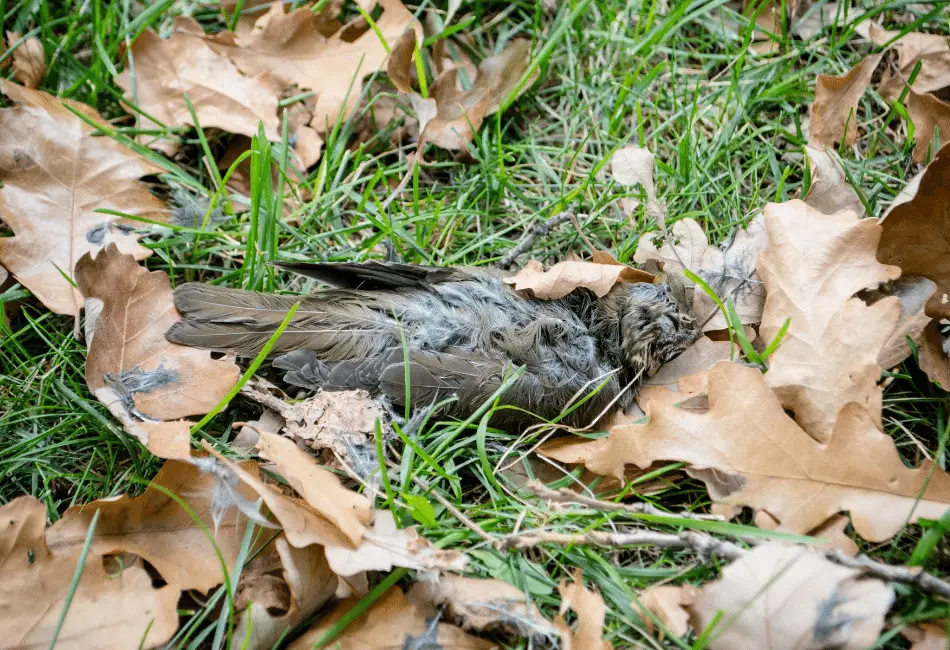There are many joys associated with homeownership. However, anyone who has owned a home long enough can tell you there are many unwanted surprises that arise more often than can be imaged.
One of the surprises that many people don’t anticipate is dealing with occasional dead wildlife in the yard. Of course, all animals die at some point, however, we often don’t expect it to be our yard where the animal departs life.
This article will focus on one animal, the bird, and what to do if one is found dead in your yard. It is important to dispose of a dead bird properly as we will highlight below.
Table of Contents
How to Dispose of a Dead Bird in the Yard?
A dead bird should be disposed of in the trash or buried. Let’s take a look at these two methods:
- Trash Method- The bird should be scooped up with a shovel and placed in a garbage bag without directly touching the bird with any body part. If you do not have a shovel or similar tool, you can use disposable gloves or a plastic shopping bag to pick up the bird to place it in a trash bag. The trash bag can be tied shut and tossed in a sealed garbage can for collection by your local waste management company. You do not want leave the dead bird in a trash bag that is exposed to the elements given the possibility that a predator may come along and make a mess of the contents of the garbage bag.
- Burial Method – Dig a hole at least three feet deep. A deep hole will prevent other animals from digging up the bird for a meal. The bird should be moved to its grave using a shovel without touching the bird with the hands or body. Once the bird is in the hole, the hole can be filled with dirt until it is level with the surrounding soil surface.
Always check with your local government for any codes or laws that regulate the burial of a dead bird. If you opt to let nature naturally dispose of the bird, be warned that you could put other animals at risk of becoming ill from a possible diseased bird.
Why Avoid Touching Dead Birds
Birds can carry a myriad of diseases, which can be the reason for the death of a bird in a yard. According to Medical News Today, birds and their waste can carry over 60 diseases. Some notable diseases are Salmonellosis, E. coli, Avian Pox, and Lyme disease.
There is a risk of a bird passing a disease to a human, which is why it is vitally important to protect your body from coming into contact with a dead bird. If you touch a wild bird (dead or alive), it’s important to thoroughly wash the area of the body that the bird touches with hot water and soap.
Remember that all items that touch the bird, directly or indirectly, will also potentially be contaminated. These items might include clothing, gloves, or tools. Anything that touches the dead bird that is not disposed of should be properly washed to avoid the spread of diseases or parasites.
Reporting a Dead Bird
You should report a dead bird in your yard if your local/state government requests you to do so. Check with your local health or wildlife agency to determine if a dead bird should be reported. You should check with these agencies prior to disposing of the bird because the agency may want to collect it for testing.
The information collected from dead birds helps with research efforts for illnesses like the bird flu or West Nile virus. An internet search can often quickly reveal the procedures to report a dead bird to the appropriate agency in your area. Reporting often can be completed online by filling out a short form.
Call An Expert
While the removal of a dead bird is a relatively easy task, an animal removal expert can always be called to take care of the dirty work. An animal removal expert is particularly useful when a bird dies in the home in a place such as the attic. The expert often not only removes the bird, but cleans/disinfects the area where the bird dies and seals off the entry point where the bird gained access to the house.
Conclusion
While birds can be a nuisance with their early morning chirping, grass seed eating, and many additional annoyances, most people would prefer to have them around the yard because of their many positive characteristics. Many people hate to find a bird dead in the yard, but that, of course, is a reality of nature. We should do our part in ensuring a dead bird is disposed of in a thoughtful manner with a primary focus on human safety when handling the bird.

